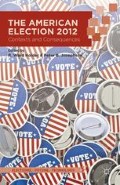Abstract
Nominating conventions culminate a lengthy process. Formal public goals of conventions include nominating presidential and vice-presidential candidates and adopting party platforms. Sustained media focus enables parties to introduce rising stars, formulate policy initiatives, strengthen party connections, and mobilize members to work on behalf of the party and candidates. Changes in delegate selection rules following the party reforms in the late 1960s reflect emerging tensions about party roles while nominating conventions matter far less in presidential nominations than in the past. Party roles as intermediaries between the public and the government are compromised in their efforts to attract increasingly detached and disinterested voters. As more voters focus on single issues, and are weakly tied to parties, party organizations are less involved in nominations as such processes become ever more candidate centered.
This chapter is dedicated to Dr. Howard Reiter (1946–2012), Professor Emeritus, University of Connecticut.
Access this chapter
Tax calculation will be finalised at checkout
Purchases are for personal use only
Preview
Unable to display preview. Download preview PDF.
Notes
V. O. Key, Jr., Politics, Parties, and Pressure Groups, 5th ed. (New York: Crowell, 1964), pp. 375–394;
Paul T. David, Ralph M. Goldman and Richard C. Bain, The Politics of National Party Conventions (Washington, D.C.: Brookings Institution, 1960), p. 249.
Howard L. Reiter, Selecting the President: The Nominating Process in Transition (Philadelphia: University of Pennsylvania, 1985), p. 121.
See Nelson Polsby, Consequences of Party Reform (New York: Oxford University Press, 1983); Howard L. Reiter, Selecting the President: The Nominating Process in Transition;
Gerald Pomper, Passions and Interests: Political Party Concepts of American Democracy (Lawrence: University Press of Kansas, 1992);
L. Sandy Maisel, Parties and Elections in America: The Electoral Process, 3rd ed. (Lanham, MD: Rowman and Littlefield, 1999);
Terri Susan Fine, “Presidential Nominating Conventions in a Democracy,” Perspectives on Political Science, Winter 2003, Volume 32, Number 1, pp. 32–39.
John Mueller, War, Presidents and Public Opinion, 2nd ed. (New York: University Press of America, 1985), pp. 84–85.
L. Sandy Maisel, Parties and Elections in America: The Electoral Process, 3rd ed. (Lanham, MD: Rowman and Littlefield, 1999), p. 267. See also
Kevin J. Coleman, The Presidential Nominating Process and the National Party Conventions, 2012: Frequently Asked Questions (Washington, D.C.: Congressional Research Service, May 14, 2012), p. 2.
Marjorie Randon Hershey, Party Politics in America, 13th ed. (New York, NY: Longman, 2008), p. 175.
Source: Karlyn Bowman and Andrew Rugg, AEI Special Report: Delegates at National Conventions 1968–2008 (Washington, DC: American Enterprise Institute Special Report, 2008), p. 1.
Editor information
Copyright information
© 2014 R. Ward Holder and Peter B. Josephson
About this chapter
Cite this chapter
Fine, T.S. (2014). The Consequences of Party Reform in the Twenty-First Century. In: Holder, R.W., Josephson, P.B. (eds) The American Election 2012. Elections, Voting, Technology. Palgrave Macmillan, New York. https://doi.org/10.1057/9781137389220_2
Download citation
DOI: https://doi.org/10.1057/9781137389220_2
Publisher Name: Palgrave Macmillan, New York
Print ISBN: 978-1-349-48396-9
Online ISBN: 978-1-137-38922-0
eBook Packages: Palgrave Political Science CollectionPolitical Science and International Studies (R0)

